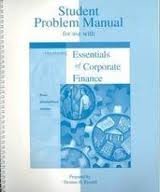Question
1. A makes a negotiable note for 10,000 issued by him to B or order, for and in consideration of 10 shares of stock. The
1. A makes a negotiable note for 10,000 issued by him to B or order, for and in consideration of 10 shares of stock. The following indorsements appear: Pay to C Sgd. B Pay to D Sgd. C Supposing it was discovered that the 10 shares were all forged shares of stock:
a. Can D enforce payment from A? Explain. b. If A cant pay, can D enforce payment from either B or C? Explain.
2. Without receiving value for the purpose of lending his name, A makes a note for 500.00 payable to the order of B who negotiates it to C, the latter knowing that A is not a party for value.
a. May C recover from A if the latter interposes the defense of absence or failure of consideration 30.00 for lending his name, will it alter the result of the case? Reason. b. Supposing A pays without objection the said 500.00, may he recover what he paid for B? Reason.
3. a) May a negotiable instrument initially issued as payable to order be converted into one payable to bearer? Explain your answer. b) How about one initially issued as payable to bearer, may it be converted into one payable to order? Explain.
4. Supposing A signs his signature on a piece of paper and delivers the same to B for the purpose of enabling B to recognize As signature. Thereafter, B completed it into a negotiable note payable to his order in the amount of 5,000. If B negotiated the instrument to C:
a. Under the above circumstances, can C be a holder in due course? Explain. b. Assuming C is a holder in due course and C negotiated the note to D who is not a holder in due course, can D enforce payment from A? Explain.
5. a. If C at the time of negotiation to him of a negotiable note knows that the indorser has been convicted of falsification of both public and private document, can C still be a holder in due course, if subsequently, the makers signature on the note happens to be forged: Explain.
b. If a negotiable note in the amount of 1,000 was negotiated to C for only 100, can C qualify to be a holder in due course? Explain.
6. a) Suppose B indorsed as follows:
Pay to C at your peril (Sgd.) B Can C further negotiate to D? Explain.
b) Suppose B indorsed as follows:
Pay to C for collection only. Can C further negotiate to D? Explain.
7. On September 15, 1980, N issued to X or order a negotiable instrument payable on October 7, 1980. Thereafter or on October 9, 1980, X negotiated the instrument to H who received it in good faith. Question: Is H considered a holder in due course? Reasons.
8. S makes a note payable to the order of CASH in the amount of 5,000.00 and issued the same to X. Thereafter, X, without any indorsement, delivered the note to Y. Y demands payment from S but S refused on the ground that there was no valid negotiation between X and Y. Is the reason of S correct? Reasons.
Step by Step Solution
There are 3 Steps involved in it
Step: 1

Get Instant Access to Expert-Tailored Solutions
See step-by-step solutions with expert insights and AI powered tools for academic success
Step: 2

Step: 3

Ace Your Homework with AI
Get the answers you need in no time with our AI-driven, step-by-step assistance
Get Started


